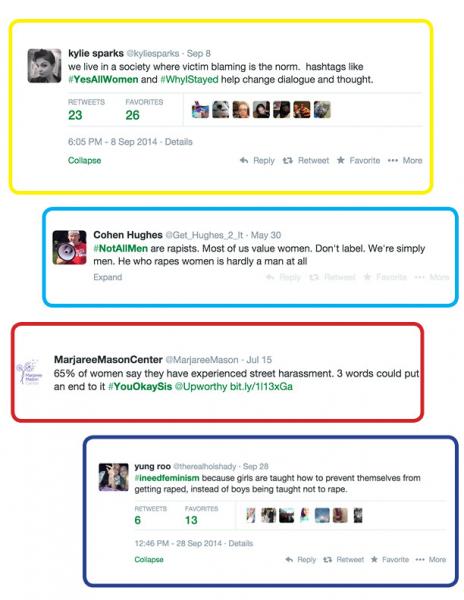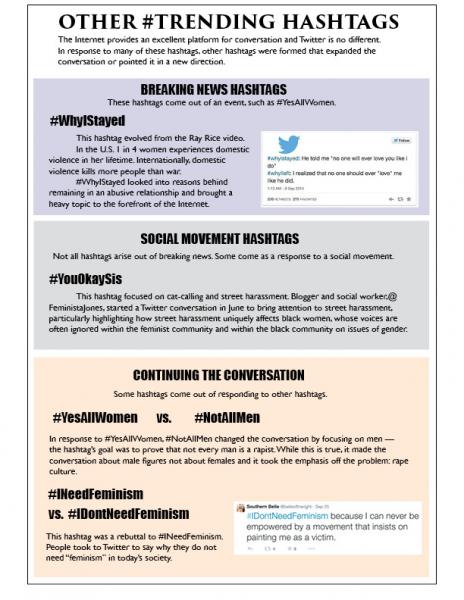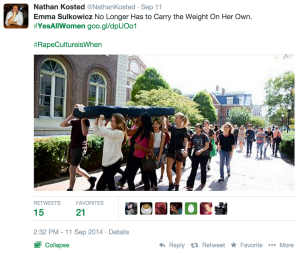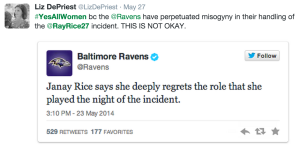Twitter As A Platform For Female Journalists And Feminism

The world of journalism is in constant motion. The days of inky fingertips and lazy Sunday mornings reading the newspaper have been replaced with quick-updating apps and online profiles. Social media outlets have transformed newsrooms, speeding up news-gathering and enabling recourse to wider ranges of sources and material, according to The Conversation, an academic journal.
Twitter, created in 2006, has served as an avenue to stimulate discussion and facilitate global expansion of newsrooms. It has also served as an avenue to stimulate discussion and education on gender equality and social activism. Within the past year, trending hashtags have created online conversation about feminism and the state of gender equality in the world today. The hashtag #YesAllWomen, for example, began as a single tweet and started a gender rights revolution.
Kjerstin Thorson is an assistant professor in USC Annenberg's School for Communication & Journalism. She has researched the effects of digital and social media on activism, persuasion and political engagement. Here she discusses the impact that Twitter has on different communities and the interesting uses of the hashtag. Video: Signe Larsen
Hashtag Frenzy

Over the past year, numerous viral hashtags have trended all around the world. They've been seen and retweeted by millions.
"I was actually initially very anti-hashtags when I first got on twitter because I didn't really understand how they were being used," said Kara Brown. Brown is a journalist for Jezebel, a website that focuses on feminist and women-centric issues. "Once I actually started getting more involved with Twitter, I understood better that hashtags are a tool and can be very useful for condensing conversations and information and streamlining, especially when you're looking for something."
Many recent viral hashtags have focused on gender equality and feminist issues. Some popular ones include #YesAllWomen, #WhyIStayed, #YouOkaySis, #SurvivorPrivilege and #INeedFeminism.
"Social media also helps gather wide-flung admiration and celebrity for some causes," said Caroline D'Angelo, a social media expert and current Eco-Management Analyst at the U.S. Department of State. It has helped start discussions, and many female journalists have used social media and hashtags to further their stories.
Kara Brown works for the female-focused website Jezebel, the self-proclaimed "Home of Shiny Happy Ladies." Before she worked for Jezebel, Brown was a blogger who frequently used Twitter to promote her work. In this video she discusses the multiple uses of Twitter and her original distrust of hashtags. Video: Belinda Cai
Providing Support
Some hashtags, like #SurvivorPrivilege, bring injustices to light and send encouragement to victims of sexual abuse. Washington Post writer George Will suggested there was no campus rape epidemic and said that women were lying about being victims of sexual violence.
Wagatwe Wanjuki was kicked out of school after being raped. After hearing Will's statements, she started #SurvivorPrivilege as a way to fight back.
"[The hashtag] was from his language—he used the word 'privilege'," Wanjuki said, in a phone interview. "Being a survivor is anything but a privilege. I have a lot of privileges, but being raped on a college campus is not one of them."
Wanjuki says that she received support for #SurvivorPrivilege from Twitter, and didn't receive any threatening messages or tweets on the internet. She believes that the wording of her hashtag was difficult to manipulate.
"I think the framing of the tweet was hard to hijack," Wanjuki said. "I did do a TV piece on BET, and someone tweeted [negatively at me], but I didn't track the entire hashtag. There weren't any direct attacks."
Wanjuki had praise for Twitter's efficiency, which makes Twitter an ideal platform for activism.
"I didn't want to write a long blog post. Twitter is good for short, snarky, public quips... it's a really good resource. You can find community really quickly," Wanjuki said.
Starting Conversations About Breaking News
Some of these hashtags stem from breaking news events, such as #YesAllWomen, which was a response to Elliot Rodger shooting and killing six people in Isla Vista in May of 2014. He left behind a manifesto vowing to get revenge on women who had rejected him.
The hashtag's purpose was to raise awareness about continuing issues of women's equality and objectification; it is not unusual for a woman to get beaten or verbally abused for turning down a man, and it is not unusual for victims to be blamed for sexual assault or rape.
While some hashtags are popular for a few days, many go away once the buzz dies down. However, #YesAllWomen returned when Emma Sulkowicz, a Columbia University student who was raped in her bed, began carrying her mattress around for her visual arts senior thesis project in protest of the university not adequately punishing her rapist. She will carry the mattress until Columbia expels him.
Women across the country brought #YesAllWomen back to discuss Sulkowicz's journey and how to help her.

The hashtag returned again in September of 2014 when a video of a NFL football player Ray Rice punching his then-fiancée surfaced. People took up #YesAllWomen to discuss how women are portrayed in abusive relationships.




